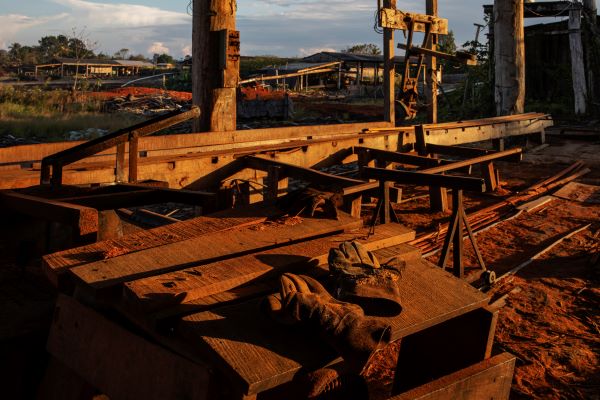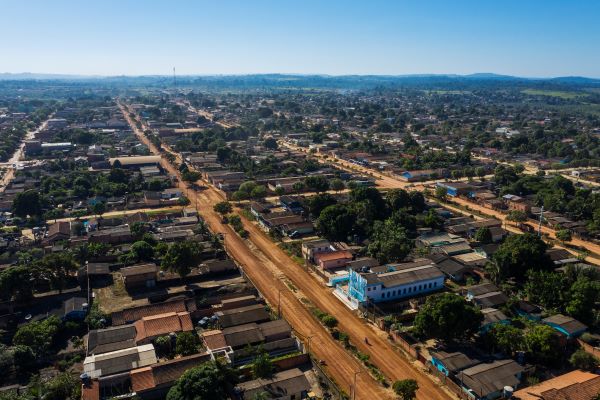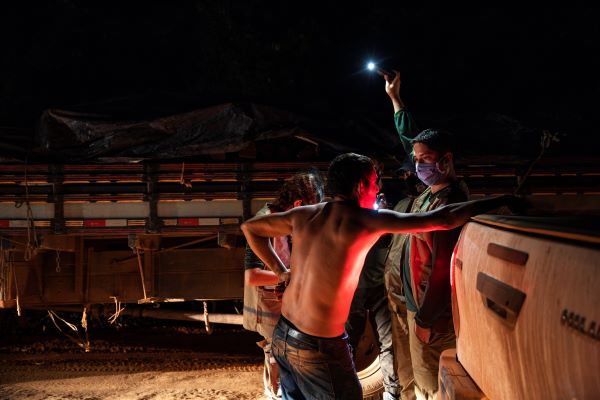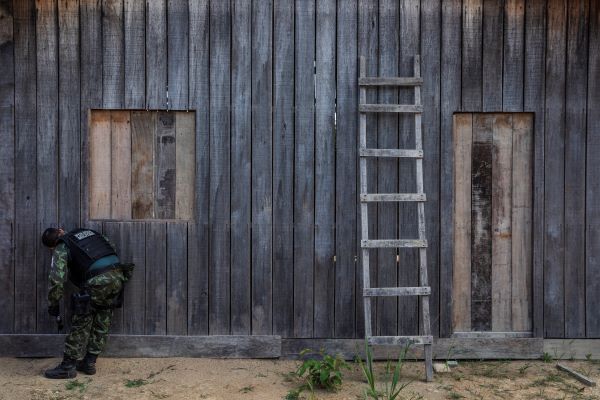After years of a tense relationship with Ibama, Brazil’s environmental agency, in 2018 the people of Uruará voted in big numbers for Jair Bolsonaro for president.
They were hoping for a relaxation of environmental inspections, which would relieve pressure on dozens of the town’s sawmills, as well as regularization of the tenure of landgrabbers in the Cachoeira Seca Indigenous Territory (TI), the most deforested indigenous land of the Brazilian Amazon region.
However, after almost two years of the Bolsonaro administration, this has not yet happened – and, in recent months, law enforcement against illegal logging and deforestation has actually increased in Uruará, a municipality created in the wake of the Trans-Amazonian highway and that, still lacking asphalted road access, is blighted by geographical isolation and a lack of economic alternatives.
Two factors have contributed to create this improbable scenario. Contrary to what might be supposed, the recent regulatory changes to the timber trade made by the Bolsonaro government relaxed exporting rules, but have not influenced inspections in the field.
Also, differently from other operations in the Amazon region, the fight against deforestation in the Cachoeira Seca Indigenous Territory was led by Ibama and undertaken without the participation of the military. The employment of the Armed Forces are Bolsonaro’s main response to the highest deforestation in the past ten years but they are inexperienced in this type of action and oppose the destruction of the environmental offenders’ equipment, an effective way to halt illegal actives in remote areas.
During the months in which Ibama maintained a permanent presence in the region, from April to September, deforestation fell by 86%, according to the monitoring of Xingu+ Network’s Sirad X satellite. This year, 729 hectares were deforested. Over the same period of 2019, the devastation reached 5,521 hectares.

A sawmill in Uruará, closed by Operation Green Brazil 2, a crackdown on environmental crime (All photos copyright Lalo de Almeida/Folhapress)
On the front against illegal logging, between May and July Ibama, in this case with support from the Army, dismantled 28 of the 44 sawmills of Uruará, one of the main hubs of the logging industry in Pará, the largest lumber producing state in the Amazon region.
Two hundred pieces of machinery were seized, besides 719 cubic meters of lumber (the equivalent of around 35 lorry cargoes), and fines were applied to a total of R$12.3 million ($2.4m). These numbers were provided by the Defence Ministry and are included in the report of Operation Green Brazil 2’s results.
Most of the lumber companies are concentrated in Beco da Morte (Death Alley), a long dirt road on the outskirts of Uruará, situated 1,006 kilometers to the Southeast of the state capital of Belém by road. When Climate Home News was in the region, in mid-July, all of the sawmills were idle. Some of them had already been dismantled by the military and their machinery had been taken to Altamira in lorries.
Not a single owner of a sawmill was willing to be interviewed. One of the ones who had had his machinery seized, known as Zé Gordo, said he was not about to “defend what’s crooked”. In an informal chat, another sawmill owner said there had never been such a blow to Beco da Morte and that it was the first time the Army had taken part in an operation in the area.
Besides Ibama and the Army, the Federal Police was also active in the region this year. On 29 July, Operation Carranca was launched, the result of four years of investigations. According to the Federal Police, Uruará and two other municipalities in the region concentrate sawmill owners with little economic power, who operate on the frontline of illegal logging.
The police got a warrant to search the home of then-administration secretary of Uruará, Bruno Cerutti do Valle. When he realized the police had arrived he tried to flush his mobile phone down the toilet, but it got stuck. Valle was arrested for possession of two firearms with expired registrations, but was released days later.
Valle has in the past been indicted for the illegal deforestation of 50 hectares and for failing to present reports on a timber management plan with his name on it. In 2019 he was the environment secretary of Uruará, heading the department responsible for licensing sawmills. He did not respond to requests for comments.
The state authorities also undertook inspections. Reinforced with some R$90 million ($17.6m) coming from Operation Carwash, Semas (the state Department for the Environment and Sustainability), with the support of the state police, seized 240 cubic meters of lumber in Uruará, closed down six illegal sawmills and arrested ten people, besides putting 1,500 hectares of land under embargo.
Finally, in November, the Federal Justice Ministry in Altamira accepted a public civil lawsuit filed by the Public Prosecutor’s Office giving Funai, Brazil’s indigenous bureau, and the Union 90 days to come up with a plan for the removal of squatters and logging operations from the Cachoeira Seca Indigenous Territory. The plan will be required to include a survey of the people who have occupied the area in good faith, so they may be removed from the land they occupy but receive compensation.

Aerial view of Uruará
The dismantling of the clandestine sawmills was the federal government’s response to an attack against an Ibama team in Uruará. On 5 May, escorted by a National Force detail, the environmental agents were blocked on a road by men connected to the sawmills. This happened as they were returning from an inspection tour in an area where illegal logging was taking place.
The uprising was a reaction against Ibama for its destruction of a logging operator’s lorries and tractors. During the argument one environmental inspector was hit by a bottle in the face, and the wound required stitches. A video of the attack circulated in the mainstream Brazilian news media.
It was not an isolated incident. Uruará has a long record of violent reactions against environmental inspections. In 2010, a Federal Police vehicle taking part in an Ibama operation was torched in the night in front of a hotel where the team of inspectors was staying.
In 2013, residents paralysed, by means of threats, the construction of two Funai surveillance posts on roads to the Cachoeira Seca Indigenous Territory, from which comes a large part of the illegally felled timber for the sawmills.
The building work was part of the Basic Environmental Plan of the Belo Monte hydroelectric plant and was undertaken by the concessionary company Norte Energia, which alleges lack of security to be able to work in the area.
In June 2019 logging operators put up roadblocks on the Trans-Amazonian highway, a pharaonic 4,200-km road built in the early 70s during the military dictatorship to conquer the “green desert”. This was the road that gave rise to Uruará, which started as a federal settlement.
Climate Home News team was also met with hostility on a rural road. Threatening to draw his machete, the driver of a logging lorry (adapted to transport tree trunks) accused us of taking pictures of his vehicle.
Under coercion, we showed him the images in our camera and mobile phones. Ascertaining there were no shots of his lorry, the driver moved back, still with his hand on his machete, and yelled out insults, calling us “NGO trash”.
Due to lack of security, Ibama agents no longer lodge in hotels in Uruará and only drive around the area under Army protection. During the months of environmental operations the inspectors stay at a Funai base located 60 kilometers from the centre of the town, under National Force police protection.

Officials from the Pará State Environment Agency speak with a truck driver who was intercepted carrying a load of illegal timber
In June this year, residents of Uruará sent a delegation to Brasília, 2,095 kilometres away, to present their grievances to President Bolsonaro. The delegation comprised around 50 people, according to the organizers. One group took two days to arrive in Brasília on pick-up trucks. A coach taking landgrabbers and squatters took four days to make the journey.
Using yellow shirts sporting the slogan “The Amazon belongs to Brazilians”, the group was able to talk to Bolsonaro for around four minutes. Facing the president, its spokespeople requested the regularization of land tenure, complained against the official recognition given to the Cachoeira Indigenous Territory in 2016, partially overlapping with Incra settlements, and criticized what they said were the truculent actions of Ibama inspectors.
“In the last 15 years, all we have had are inspections. No one has ever come to regularize our lands,” said one of the representatives of Uruará. “I own a sawmill, all legal. We’re not being allowed to work,” said another one. Because their coach trip took so long, the landgrabbers did not arrive in time for the face to face meeting with the President.
After listening to the delegation’s grievances, Bolsonaro said: “I’m aware of the problems, but I can’t do much to help. It’s the coordination of people, of legislation. If you mess with an environmental decree, it has to be enacted into law.” Then he added: “I have already helped you out by not doing much.”
“Most people are happy with the government and believe in it,” said the lawyer Leonardo Sidônio, who was part of the delegation and defends sawmill owners of Uruará. “We know the Brazilian government is under pressure from international organizations, other countries, NGOs and financial organizations. Which, in our view, is what justifies these operations taking place here.”
Contrasting with Pará – the only state outside of the Northeast of Brazil where leftist Fernando Haddad, of the PT (Workers’ Party) won the second round of the presidential election – Uruará voted for the far-right Bolsonaro in both rounds. The president received 55.4% of the vote in the first round. Against the PT candidate, in the second round, his percentage rose to 66.7%.
Once in power, Bolsonaro relaxed several rules around the lumber industry, but inspectors we spoke to say these measures have not had an impact on the inspections in the areas where illegal logging takes place. That is because the recent changes have mainly favoured export companies, that wield greater economic power. It is not the case of the sawmills of Uruará, many of which are suppliers to the larger companies.
As is the case in other parts of the Amazon region, the depletion of the tree stock in the managed areas, invaded plots and privately owned plots leads loggers to steal timber from protected areas.

A military police officer inspects a shack in an illegally deforested area of Uruará
The main source of timber in Uruará has been Cachoeira Seca, home of a group of the Arara tribe that was first contacted in 1987. A survey by the Instituto Socioambiental (ISA) found 894km of illegal roads built within the Indigenous Territory, one of the few places in the region where the valuable ipê tree can still be found.
Inspectors, including Federal Highway Police officers, have identified various scams used to cover up the illegal origin of timber in the region. They include overstating the quantity and size of trees within the managed areas and the use of timber extraction credits from the neighbouring state of Mato Grosso.
Despite the use of selective tree felling in the timber industry, the activity usually opens way the way to deforestation. This is what has been happening in Cachoeira Seca, where more recent invaders mingle with the families who occupied the land in good faith, since the Indigenous territory was created overlapping with Incra settlements. Most of these date from the 1970s, but one of them, Macanã 1, was created in 2006, during the Presidency of Lula (PT), when the demarcation of the Indigenous territory was already underway.
The whole imbroglio has contributed to the chaos of land tenure in the municipality, a situation that is more of a rule than an exception in the Amazon region. A survey by researcher Brenda Brito, from Imazon, shows that the properties with title deeds in the municipality cover 91.5 thousand hectares. But the areas that are untitled or about which there is no information come to 558 thousand hectares. The numbers are from 2017 and do not include settlements.
Ibama’s good results in Uruará and Cachoeira Seca show the agency’s importance in preventing and monitoring illegal deforestation in the Amazon, says Suely Araujo, who headed Ibama until early 2019 and now works with advocacy group Climate Observatory.
According to her, Ibama, often attacked by Bolsonaro as an enemy of agribusiness, needs more budget and personnel resources as well as to have its decision making restored.
Araujo says: “The 2020s approach of giving the operations command to the military over other government agencies is wrong. Operations such as Green Brazil 2 are expensive and generate few results. The military don’t have the expertise in environment matters They have a relevant job controlling the borders, they can and should support the environment agencies, but the Environment National System must be in charge.”
This reporting is part of The Amazon under Bolsonaro, a collaboration between Folha De Sao Paulo and Climate Home News. Monica Prestes contributed reporting from Manaus. Translated from the Portuguese by Clara Allain.